- Home
- Gustave Aimard
The Indian Chief: The Story of a Revolution Page 20
The Indian Chief: The Story of a Revolution Read online
Page 20
CHAPTER XX.
BEFORE THE ATTACK.
When within gunshot of the hacienda the count commanded a halt.
"De Laville," he said to the captain, "push on ahead, and occupy thehacienda in force: we shall have our headquarters there."
"What is the use of that?" Belhumeur asked. "Did you not put faith inmy words, then? Don Rafael and his family will be delighted to receiveyou and greet you with open arms."
The count smiled, and bent down to the Canadian's ear.
"My friend Belhumeur," he said to him in a low voice, "you are achild who will understand nothing. I take these precautions whichgrieve you so much, not for my own sake, but on behalf of our friends.Supposing, as may be unfortunately the case, that we are beaten by theMexicans--what will happen then? That Don Rafael will inevitably falla victim to the sympathy he has evinced for us; while, by acting as Ido, he bows to force, and the Mexican authorities will be unable, inspite of all their desire, to render him responsible for our stay at hishouse."
"That is true," the Canadian answered, struck by the logic of thisreasoning.
"Still," Don Louis continued, "in order to avoid any misunderstanding,you will accompany the captain, and while he is talking loudly you canwhisper to our friends what the reason is."
Five minutes later the detachment started at a gallop, followedpresently by the rest of the column. All took place as the count hadarranged. Warned by Belhumeur, Don Rafael protested energeticallyagainst the forced occupation of the hacienda, and feigned only to yieldto superior force. The estate was definitively occupied, and Don Rafaelmounted with some of his servants, in order to go and meet the column;but, by the count's orders, it did not stop at the hacienda, but pushedon and camped about two leagues from Hermosillo.
The count and Rafael met, not like strangers to each other, but as oldfriends delighted at meeting again, and entered the hacienda, conversingin a low voice. Before dismounting, the count sent off couriers andscouts in every direction, in order to have certain news about theenemy; and only keeping with him an escort of eight men, he sent theothers to the bivouac, and entered the hacienda.
Don Ramon, Don Rafael's father, and Dona Luz, that amiable womanwhose touching history we told in a previous story,[1] were waiting,surrounded by their servants, the arrival of the Frenchmen at the doorof the hacienda.
"You are welcome, valiant combatants for the independence of Sonora,"General Don Ramon said as he held out his hand to the count.
The latter leaped from his horse.
"May God grant that I may be as fortunate as you have been, general!"he replied with a bow. Then, turning to Dona Luz, "Pardon me, madam,"he said to her, "for having come to trouble your peaceful retreat: yourhusband is alone to blame for the indiscretion I am committing at thismoment."
"Senor conde," she answered with a smile, "do not make such excuses:this house and all it contains belong to you. We see your arrival withjoy--we shall witness your departure with sorrow."
The count offered his arm to Dona Luz, and they entered the hacienda.But the count was restless--his glance wandered incessantly.
"Patience!" Don Rafael said to him with a meaning smile; "you willsee her. It would have been imprudent for her to appear sooner, so weprevented her."
"Thanks!" the count said; and the cloud which obscured his noble facedisappeared at once.
The interview of the two lovers was as it should be; that is to say,calm, affectionate, and deeply felt. The count warmly thanked FatherSeraphin for the protection he had accorded the maiden.
"Ere long," Dona Luz said, "all your torments will be ended, and youwill be able to yield to the passionate emotions of your heart withoutconstraint."
"Yes," the count answered pensively, "tomorrow will probably decide myfate, and that of the woman I love."
"What do you mean?" Don Rafael exclaimed.
The count looked anxiously around him: he saw that he could speak, andthat those who pressed toward him were sincere friends.
"Tomorrow," he said, "I shall attack Hermosillo and take it, or falldead in the breach."
All present were in a state of stupor. Don Rafael made Black Elk a signto stand outside the door to keep off all comers, and then returned tothe count.
"Have you really that idea?" he asked him.
"Were it not so, should I be here?" he said simply.
"But," Don Rafael continued urgently, "Hermosillo is an inclosed townwith strong walls."
"I will force them."
"It has a garrison of 1200 men."
"Ah!" he said indifferently.
"For two months the militia have been exercised daily."
"Militia!" he replied with a disdainful air. "I suppose, at any rate,they are numerous?"
"About 3000 men."
"All the better."
"General Guerrero, who has at length discovered that his flank wasturned, has thrown himself into the city with 6000 Indians, and isawaiting other reinforcements."
"That is the reason, my friend, why I must attack at once. I havealready, according to your calculation, opposed to me 11,000 men,intrenched behind good walls. The longer I wait, the more numerous theywill grow; and if I do not take care," he added with a laugh, "that armywill end by growing so considerable that it will be impossible for me todestroy it."
"You are perhaps unaware, my friend, that Hermosillo is surrounded bymarket gardens, which render the approaches almost impracticable?"
"Believe me, my good friend," the count replied carelessly, "I shallenter by the gates."
The company gazed on the count with an amazement akin to terror. Theylooked at each other, and seemed to be asking whether they had not todeal with a maniac.
"Pardon me, my friend," Don Rafael continued, "but I think you said thatyou intended to attack tomorrow?"
"Certainly."
"But supposing your troops have not arrived?"
"What! my troops not arrived? Did not you see them march past thehacienda an hour ago?"
"Yes, I saw a small detachment pass--your vanguard, of course."
"My vanguard!" the count exclaimed with a laugh. "No, my good friend,that small detachment forms my entire _army_."
Don Rafael, Don Ramon, and, the other persons present were men ofrecognised courage. On several occasions they had sustained giantcombats against enemies tenfold in number; in short, they had furnishedproof of the most extravagant courage and most insane temerity. Butthe count's eccentric proposition of going coolly with a handful ofadventurers to take a city defended by 10,000 men seemed to them soextraordinary and so incredible, that they remained dumb for a moment,hardly knowing whether they were awake or suffering from a frightfulnightmare.
"Tell me, my friend," Don Rafael exclaimed, his arguments quiteexhausted, "how many men can you deploy in line?"
"Hang it! not many," the count said with a smile, "I have invalids:still I can dispose of about two hundred and fifty, and I hope theywill be sufficient."
"Yes," Dona Angela said enthusiastically, "they will be sufficient, forthe cause these men defend is holy, and God will protect them."
"Don Rafael," the count said simply, "have you ever heard of what iscalled the _furia Francese?_"
"Yes, but I confess to you that I do not exactly understand what it is."
"Well," he added, "wait till tomorrow, and when you have seen thisformidable army crushed, destroyed, and dispersed like autumn leavesby the wind; when you have been present at the capture of Hermosillo,you will know what _furia Francese_ is, and understand the prodigiesof valour which history has recorded, and Frenchmen perform almost insport."
The conversation ended here, and they proceeded to the dining room,where the refreshments, of which the count stood in such need, had beenprepared. So soon as they rose from table the count asked leave toretire to the apartment prepared for him, and begged Father Seraphin tofollow him. They remained for a long time shut up, talking ear to ear.When the missionary came out his eyes were red, and traces of tearsfurrow
ed his pale cheeks. The count pressed his hand.
"So, then," he said, "in case of a mishap----"
"I will be there, count, trust me;" and he retired slowly.
During the evening, and, indeed, far into the night, the count listenedto the reports of his scouts and spies: the news they brought coincidedin every respect with the information imparted by Don Rafael. GeneralGuerrero had hurried to Hermosillo, where he was securely intrenched.
Valentine and Curumilla were the last to arrive; but they were not thebearers of bad news. Valentine, at the head of a party of foragers, had,by Curumilla's advice, advanced along the Guaymas road, and surprised aconvoy of provisions and ammunition intended for the Mexicans. This hadbeen taken to the camp by the hunter's care, and was warmly welcomedby the Frenchmen, whose stock of food, as we have seen, was entirelyexhausted. Captain de Laville, for his part, had surprised three or fourof the enemy's patrols, which had imprudently advanced too far. Thecount sent Curumilla to the captain with orders to take advantage ofthe darkness of the night to advance, and push on his advanced posts towithin a gun-shot and a half of the town.
When alone with Valentine he spread out a plan of Hermosillo on thetable, and both bending over it, began studying it attentively. We havealready described Hermosillo several times: we will limit ourselves tosaying that the market gardens by which that city is surrounded areinclosed with walls, behind which it is easy to place _tirailleurs_,whom the nature of the ground enables to fall back from post to post,constantly protected by the walls, which are about three feet inthickness, and built of _adobas_. In addition, on the side on whichthe count was marching, a wide and deep ditch, which could only betraversed by means of a bridge, at the end of which a strong body oftroops was doubtless posted, formed an almost impregnable defence.
As may be seen from our description, Hermosillo is far from beingan open town, which can be seized without striking a blow; and, inattempting to carry it at the head of 250 men, the Count de PreboisCrance, if he succeeded, might justly flatter himself on havingaccomplished one of the greatest exploits of modern times.
General Guerrero, according to the reports of the scouts, and theMexican officers under his command, affected a superb contempt for thesenaked-footed Frenchmen, as they called them, and promised to give themso rough a lesson that they would not feel disposed to begin again.Curumilla, however, had brought back a piece of news which could notfail to give the count hopes. In spite of the immense preparations hehad made, against the company, General Guerrero had been so surprisedby the news of its hurried march on Hermosillo, and the daring mannerin which it had turned its advanced posts, that, in his hurry to go tothe aid of the menaced city, he had been constrained to leave behind himthe greater part of his forces, and the city, in reality, only containedtwelve or fifteen hundred defenders, doubtlessly a very large number,but much less than the count had expected to find.
Curumilla had peacefully entered the city. His being an Indian served ashis safeguard, and he had seen, visited, and examined everything. Thisnews the Araucano brought back on reporting to the count the executionof the orders sent through him to Captain de Laville. The count and thehunter rubbed their hands, and hastened to make their final arrangements.
Among the hacenderos present at the conference of La Magdalena was onewhose influence was immense upon the pueblos. It was the man who, inthe name of his countrymen, had assured the count that, so soon as animportant town had fallen into the hands of the French, the signal forrevolt should be given, and the country roused in a few days, in orderto effect a decisive diversion. Don Louis, not wishing to lose a moment,and in the certainty of success, wrote him a letter in which, afterannouncing to him the fall of Hermosillo, he urged him to be ready tosupport him, and give the signal for insurrection.
We mention this fact to prove not only that the count believed himselfsure of succeeding, but also foresaw everything with that sublimeintuition only possessed by men of genius.
The letter written, and the last arrangements made, the count andValentine left the room. It was about two in the morning: the sky wasgloomy, and warm gusts coming from the desert bowed down the leafycrowns of the trees.
The two foster brothers went down into the patio, where all theinhabitants of the hacienda had assembled to salute the count on hisdeparture. Dona Angela, wrapped up in a long white dressing gown, withpallid face and eyes filled with tears, looked like a phantom in theglare of the torches shaken by the peons. The escort had mounted and satmotionless. Curumilla held the horses of the two Frenchmen. When theyappeared, all raised their hats and saluted with a deep and respectfulbow.
"Farewell, Don Louis," Don Rafael said to him. "May Heaven grant you thevictory!"
"May Heaven grant you the victory," Don Ramon repeated, "for you arefighting for the independence of a people!"
"Never were more fervent prayers offered up than we shall make for you,Don Louis," Dona Luz then said.
The count felt his heart contract.
"I thank you all," he said with much emotion. "Your wishes do me good:they prove to me that among the Sonorians there are some who comprehendmy noble object. Thanks once again."
Dona Angela came up to the count.
"Don Louis," she said to him, "I love you. Do your duty."
The count bent down to her, and imprinted a kiss on her pale forehead.
"Dona Angela, my affianced!" he said with a tenderness impossible torender, "you will see me again either a conqueror or a corpse."
And he made a move as if to depart. At this moment Father Seraphin cameto his side.
"What!" he said with surprise, "do you accompany me, my father?"
"I am going where duty calls me, sir," the missionary replied with thatangelic simplicity which was so characteristic of him--"where I shallfind pain to console, misfortunes to alleviate. Let me follow you."
Louis pressed his hand silently, and after bowing once again to thefriends he was leaving, perhaps for ever, he gave the signal fordeparture, and the cavalcade soon disappeared in the darkness.
Dona Angela remained cold and motionless in the doorway so long as shecould hear the horses' hoofs echoing on the road. When every sound haddied away in the distance a long-restrained sob burst from her.
"Heavens, heavens!" she exclaimed in despair, and stretching out herhands to the sky. Then she fell back in a fainting fit. Dona Luz and DonRafael hastened to her aid, and carried her into the hacienda, wherethey eagerly tried to restore her to consciousness. Belhumeur tossed hishead several times, and prepared to shut the gate of the hacienda.
"Not yet," a voice said to him; "let us go out first."
"Eh, what?" he said. "Where the deuce do you want to go at this hour,Black Elk?
"To tell you the truth," the hunter answered, "I am almost a Frenchman,since I am a Canadian, and so I am going to help my countrymen."
"Halloh!" Belhumeur exclaimed, struck by these words, "that's not a badidea. By Jove! you shall not go alone; I will accompany you."
"All the better; then there will be three of us."
"How three? Who else is coming with us?"
"Eagle-head, by Jove! The chief says there are down there some Indians,enemies of his nation, whom he should like to have a set-to with."
"Let us be off, then. I believe that the count will be pleased to havethree fighting men more, like us, in his company."
"By Jove! I should think so," Belhumeur said.
"I do not care," Black Elk remarked, "whatever you may say, he is a finefellow. What do you think about him, you who know him, eh?"
"Tough as hickory," the Canadian answered intrepidly.
Without further commentary the three bold hunters mounted and proceededin the track of the count.
[1] See "The Trappers of Arkansas."

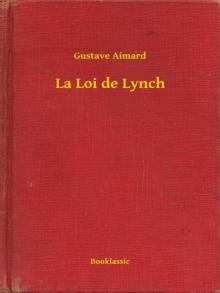 La loi de lynch. English
La loi de lynch. English The Guide of the Desert
The Guide of the Desert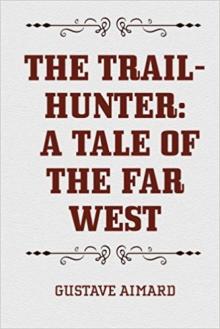 The Trail-Hunter: A Tale of the Far West
The Trail-Hunter: A Tale of the Far West The Pirates of the Prairies: Adventures in the American Desert
The Pirates of the Prairies: Adventures in the American Desert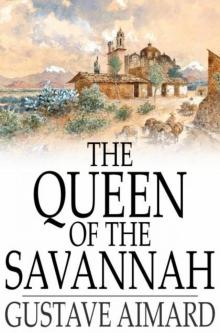 The Treasure of Pearls: A Romance of Adventures in California
The Treasure of Pearls: A Romance of Adventures in California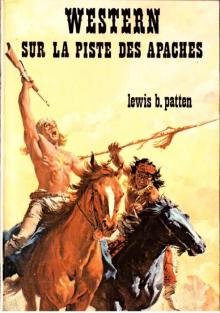 Les outlaws du Missouri. English
Les outlaws du Missouri. English Les trappeurs de l'Arkansas. English
Les trappeurs de l'Arkansas. English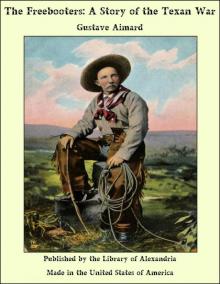 The Border Rifles: A Tale of the Texan War
The Border Rifles: A Tale of the Texan War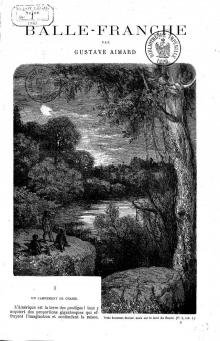 Balle-Franche. English
Balle-Franche. English The Queen of the Savannah: A Story of the Mexican War
The Queen of the Savannah: A Story of the Mexican War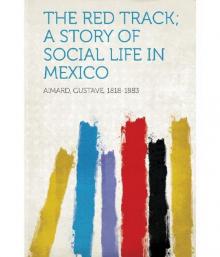 The Red Track: A Story of Social Life in Mexico
The Red Track: A Story of Social Life in Mexico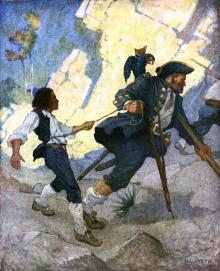 La fièvre d'or. English
La fièvre d'or. English The Pearl of the Andes: A Tale of Love and Adventure
The Pearl of the Andes: A Tale of Love and Adventure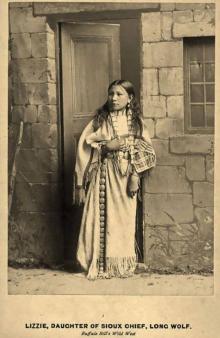 Les fils de la tortue. English
Les fils de la tortue. English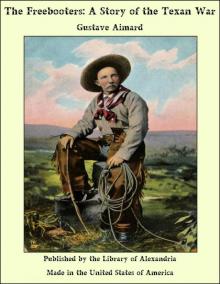 The Indian Chief: The Story of a Revolution
The Indian Chief: The Story of a Revolution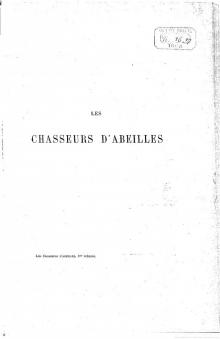 Les chasseurs d'abeilles. English
Les chasseurs d'abeilles. English The Adventurers
The Adventurers